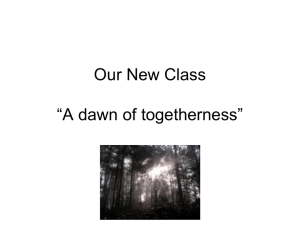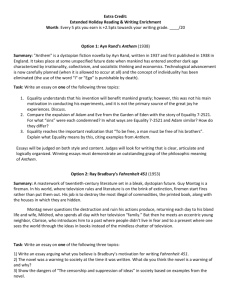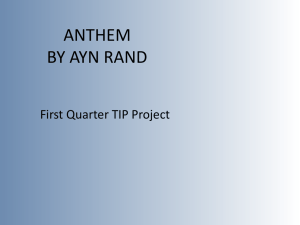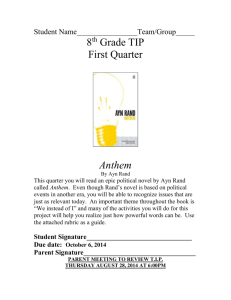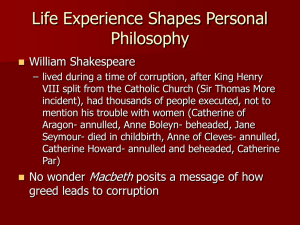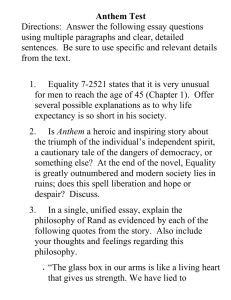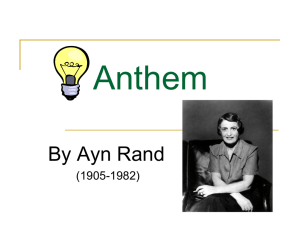11th Grade Early College Anthem Reading Packet.doc
advertisement
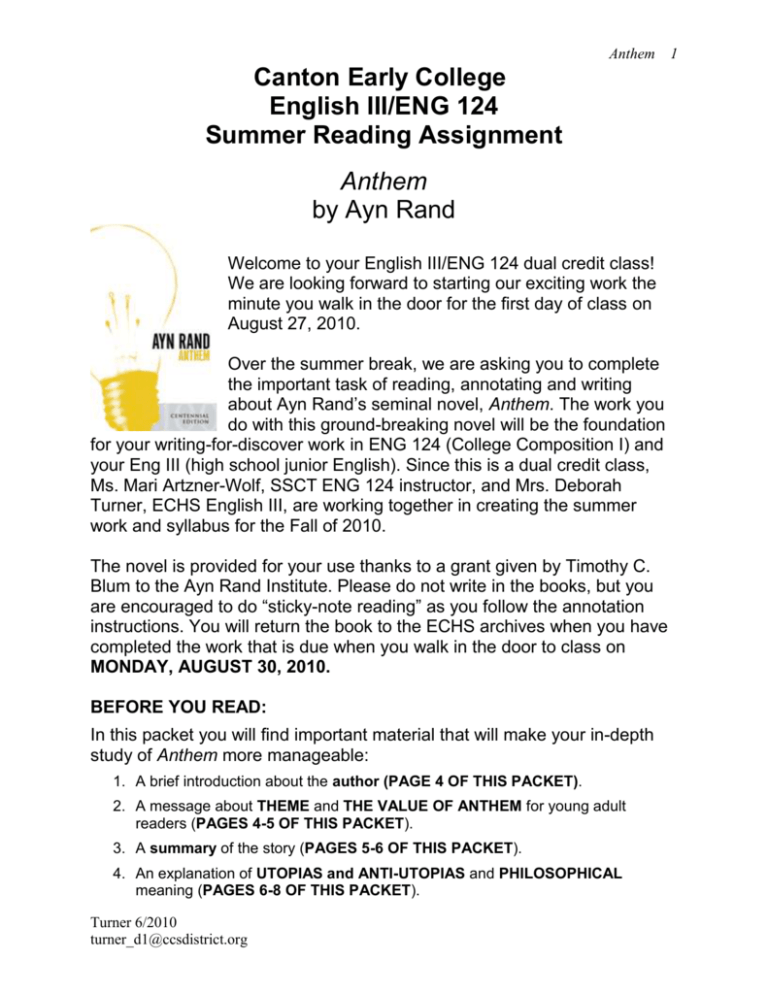
Anthem 1 Canton Early College English III/ENG 124 Summer Reading Assignment Anthem by Ayn Rand Welcome to your English III/ENG 124 dual credit class! We are looking forward to starting our exciting work the minute you walk in the door for the first day of class on August 27, 2010. Over the summer break, we are asking you to complete the important task of reading, annotating and writing about Ayn Rand’s seminal novel, Anthem. The work you do with this ground-breaking novel will be the foundation for your writing-for-discover work in ENG 124 (College Composition I) and your Eng III (high school junior English). Since this is a dual credit class, Ms. Mari Artzner-Wolf, SSCT ENG 124 instructor, and Mrs. Deborah Turner, ECHS English III, are working together in creating the summer work and syllabus for the Fall of 2010. The novel is provided for your use thanks to a grant given by Timothy C. Blum to the Ayn Rand Institute. Please do not write in the books, but you are encouraged to do “sticky-note reading” as you follow the annotation instructions. You will return the book to the ECHS archives when you have completed the work that is due when you walk in the door to class on MONDAY, AUGUST 30, 2010. BEFORE YOU READ: In this packet you will find important material that will make your in-depth study of Anthem more manageable: 1. A brief introduction about the author (PAGE 4 OF THIS PACKET). 2. A message about THEME and THE VALUE OF ANTHEM for young adult readers (PAGES 4-5 OF THIS PACKET). 3. A summary of the story (PAGES 5-6 OF THIS PACKET). 4. An explanation of UTOPIAS and ANTI-UTOPIAS and PHILOSOPHICAL meaning (PAGES 6-8 OF THIS PACKET). Turner 6/2010 turner_d1@ccsdistrict.org Anthem 2 5. A Term and Definition page with Illustrations of Terms in Anthem to assist you in providing support for the answers to the Detailed Written Responses (PAGE 9 OF THIS PACKET). Please read the information outlined above BEFORE you begin the novel. It is vital for your understanding of the content of this work. AN OVERVIEW OF YOUR WORK: (I.) READ EVERY PAGE IN THE BOOK INCLUDING: The Frontice Piece by Ayn Rand (the page immediately inside the front cover) The Introduction by Leonard Peikoff pp. 5-13 The Author’s Foreword pp. 14-16 The Reader’s Guide to the Writings and Philosophy of Ayn Rand pp. 107 (after the final page of the novel) (II.) TAKE READING NOTES (sticky-note reading) Annotate the following literary devices: o Character Analysis o Point of View o Symbolism AND Figurative Language o Theme o Vocabulary (See instructions that follow in this packet about how to construct the reading notes [sticky-note reading]) (III.) ANSWER THE DETAILED WRITTEN RESPONSE QUESTIONS IN COLLINS TYPE III FORMAT (PAGE 10 OF THIS PACKET): FCA #1 = Write in blue or black ink or type; double-line spaced, one side of the page only; MLA format for header and page #s, heading, and in-text citations from the text. FCA #2 = Address all parts of each prompt in paragraph format using examples and details from the text. (Remember to use MLA format for in-text citations from the text as you support your answers. FCA #3 = Check spelling, punctuation, and grammar. (IV.) CHOOSE AND COMPLETE ONE CREATIVE WRITING ACTIVITY FOR ANTHEM (PAGE 11 OF THIS PACKET). Turner 6/2010 turner_d1@ccsdistrict.org Anthem 3 Assessments: 1. Detailed Written Response Questions Collins Type III Writings = (50 pts. Eng III) 2. Creative Writing Activity = (50 pts. Eng III) 3. When you return to school on August 27, 2010 (or August 31—depending on assembly schedules), you will take a DID-YOU-READ-IT? test over Anthem. Do NOT expect to do well on the test if you have not read the novel. You will be permitted to use your annotations on your test. ( Eng III assessment) 4. You will compose a timed, in-class essay on a novel topic or theme on a date to be announced in the Syllabus for ENG 124/Eng III. Again, you will be permitted to use your annotations. (Combined ENG 124/Eng III assessment) Turner 6/2010 turner_d1@ccsdistrict.org Anthem 4 INTRODUCTION INTRODUCTION: Ayn Rand (1905–1982) was born in Russia and educated under the Communists, experiencing firsthand the horrors of totalitarianism. She escaped from Russia in 1926 and came to America because it represented her individualist philosophy. Anthem, written in 1937, is Ayn Rand’s novelette about the essence of collectivism. It was published in England in 1938, went into a limited American edition in 1946, and was then published by New American Library in 1961. THEME: “It is a sin to write this. It is a sin to think words no others think and to put them down upon paper no others are to see.... There is no transgression blacker than to do or think alone.” So begins Anthem, whose theme is, in Ayn Rand’s words, “The meaning of man’s ego.” Anthem projects a completely collectivized society, a society in which the word “I” no longer exists. Anthem is not just a story about the individual being swallowed by the collective. It is also an identification of how that can happen, what ideas people must first accept before such a totalitarian society can take hold. And Anthem is not merely a story about the horrible, depressing life of people in a collectivist society; it is also about the triumph of the individual’s independent spirit, the triumph of those who reject the ethics of collectivism. THE VALUE OF ANTHEM FOR YOUNG ADULT READERS: Anthem contains many elements that appeal strongly to young readers. It is an exciting and inspiring story, with heroic characters risking their lives for their ideals. It has mystery, carrying students into a science-fiction world of the future. It portrays events with grand significance, challenging readers to decide not just what will happen to particular characters, but what the world should be like. Anthem raises ethical and political issues at a time in the lives of young people when such issues are beginning to take on critical importance: Who am I? Is it possible to stand on my own? The book asks basic question about society: If we could choose what kind of society to have, what should we choose? What is the moral and just society? Does my life belong to the group? Do I have the right to pursue my own happiness? Can a society without freedom be productive? Anthem serves as an introduction to what Ayn Rand called her Romantic Realist approach to literature. Her fiction is Romantic because she portrays “not the random trivia of the day,” not the folks-next-door, but “the timeless, fundamental, universal problems and values of human existence.” Romanticism contrasts with Naturalism, which holds that people are crushed by social forces and cannot control their own destiny. Ayn Rand’s fiction is Realist because she deals with real problems of normal people (not monsters, superhumans or robots). Anthem carries the same heroic view of the individual as her later novels, The Fountainhead and Atlas Shrugged. Anthem also Turner 6/2010 turner_d1@ccsdistrict.org Anthem 5 provides an introduction to the ideas she was later to develop into a full, systematic philosophy, which she called “Objectivism.” SUMMARY OF THE STORY: When the story begins, sometime in the distant future, the hero (known only as Equality 7-2521) is a young man in his late teens or early twenties. Speaking in the first person plural (Anthem is his diary), he describes his society and his attitude towards it. The society is controlled by the World Council, which directs every aspect of every individual’s life. Each citizen’s life has been controlled from birth: he is conceived in the Palace of Mating. Instead of living with his parents, he first lives in the Home of Infants. As he grows older, he moves to the Home of Students, then to a special home for those of his assigned vocation, and, finally, at old age, to the Home of the Useless. Citizens are constantly barraged with propaganda from the leaders, who preach the glory of working for one’s brothers and the duty of fulfilling “the needs of society.” The alternative is death: “If you are not needed by your brother men,” proclaim the Teachers, “there is no reason for you to burden the earth with your bodies.” It is clear that the citizens have accepted the morality of altruism, which advocates sacrifice to others. As a consequence, the leaders do not rule by physical force or even by the threat of force: they don’t need to. The citizens have no personal desires—they have either given them up voluntarily or never formed them. Citizens obey the leaders without question. Those who have any doubts about their society feel guilty that they do. As Equality 7-2521 begins to describe his life, it becomes clear that the society he lives in has no industry or technology. There are no factories, no machines, almost nothing at all that is man-made. His days are filled with drudgery and routine. Although capable of great intellectual achievement, he has been assigned the job of Street Sweeper. This assignment was not the result of bureaucratic incompetence; on the contrary, the leaders recognized his ability and considered it to be a threat. But he has come upon the remains of a subway entrance from the Unmentionable Times, many years in the past, when there was a prosperous industrial society. Even to think of these times has been forbidden. His individuality still alive, he defies the rules and returns again and again to the subway and to the fascinating technological remains from the past. Down in the subway, he works on abandoned wires and equipment, and he eventually rediscovers electricity and reinvents electric light. He presents his light bulb to the Council of Scholars, believing that they will welcome such a labor-saving, time-saving, life-saving device. However, the Council is frightened by his invention and by his daring to come up with something on his own: “What is not thought by all men,” they cry, “cannot be true.... What is not done collectively cannot be good.” When the Council threatens to destroy the light bulb, he admits to himself that his society is evil. Fleeing with his invention, he escapes to the Uncharted Forest. He knows that the leaders are afraid to venture into the unknown, either intellectually or physically. There he is joined by a young girl with whom he had earlier fallen in love, despite the ban on personal love and friendships. Now named “Prometheus” and “Gaea,” they find a wellpreserved house from the Unmentionable Times. In the house is a library of books from those times, and they thus discover the ideas that made possible the freedom and prosperity of the past: man is a separate individual, with Turner 6/2010 turner_d1@ccsdistrict.org Anthem 6 a self that is the source of creativity; it is wrong to live for others; conformity, obedience and sacrifice are the cause of human unhappiness and destruction. It is, he now knows, “my eyes which see,” “my mind which thinks,” “my will which chooses.... Neither am I the means to any end others may wish to accomplish. I am not a tool for their use. I am not a servant of their needs. I am not a bandage for their wounds. I am not a sacrifice on their altars.” In these books, he has discovered the word he has been struggling to identify: the word “I.” UTOPIAS AND ANTI-UTOPIAS: This type of fiction is often called “anti-utopian,” meaning that the world presented is the world as it should not be. Other well-known anti-utopian novels, such as 1984 and Brave New World, present collectivism as the worst-possible society. In those books, the society is tyrannical yet has a highly technological economy—a combination that Ayn Rand did not believe possible. She held that economic progress depends upon freedom, that the uncoerced mind is the source of technology, prosperity and progress. Thus the collectivist society she depicts is stagnant and primitive. PHILOSOPHIC MEANING: Philosophic issues arise throughout the story, but they are dramatized in action—in the hero’s struggle against his society; they do not appear as philosophic speeches. In this union of ideas and dramatic action, Ayn Rand was unique: she was a philosopher, who wrote nonfiction works on a wide range of philosophic issues; but she was also a novelist, who wrote exciting stories with profound philosophic content. In her novels, she dramatized her philosophy, making those issues alive, concrete and real, showing readers how that philosophy applies to the events of men’s lives. INDIVIDUALISM VS. COLLECTIVISM: The principal political issue in Anthem—and in society at large—is the issue of individualism vs. collectivism. The society depicted in Anthem is a collectivist society. “Collectivism,” Ayn Rand wrote, “means the subjugation of the individual to the group— whether to a race, class or state does not matter.” In such a society, the individual is owned by the group; he has no right to a private existence, which means no right to lead his own life, pursue his own happiness or use his own property. The individual exists only as part of the group, and his worth is determined by his service to the group. The alternative to collectivism is individualism, the view advocated by Ayn Rand. “Individualism,” she wrote, “regards man—every man—as an independent, sovereign entity who possesses an inalienable right to his own life, a right derived from his nature as a rational being.” Individualism does not mean that one can do whatever he feels like doing; it means that every man is an individual and has the same rights. “An individualist is a man who says: ‘I will not run anyone’s life—nor let anyone run mine. I will not rule or be ruled. I will not be a master nor a slave. I will not sacrifice myself to anyone—nor sacrifice anyone to myself.’” SELFLESSNESS: Anthem dramatizes Ayn Rand’s view that the self is destroyed in a collectivist society. How is the lack of self—or selflessness—shown? No one has a personal name, for, under collectivism, individuals are interchangeable. To prefer one person to another (as Turner 6/2010 turner_d1@ccsdistrict.org Anthem 7 a friend or romantic partner) is to commit the cardinal sin: the Transgression of Preference. As in Nazi or Communist societies, it is wrong to disagree, to have independent thoughts, even to ask questions, because to do those things sets one apart from others. Self-assertion is forbidden. All decisions are made by the Council in the name of the whole. Individuals have no rights. No individual choice is allowed by the government: “everything which is not permitted by law is forbidden.” Anthem depicts what happens to a society that implements selflessness. The result, according to Ayn Rand, is a subhuman society: what makes human beings human is having a self, which means having a mind. A selfless individual is a mindless individual. To practice selflessness, one must abstain from thinking and obey one’s masters. To practice collectivism, one must merge himself into the group, and the only way to do this is to obliterate individual identity and individual thought. The result is the kind of society found in Anthem, a society of mindless robots, people with no motivation, no ambition, no hope. They are unable to create anything, and the society they live in has no room for creativity. EGOISM: If lacking an ego means that one has become a robot, what, for Ayn Rand, is the exact meaning of egoism? Egoism means “concern with one’s own interests.” It means that oneself, rather than others, is the proper beneficiary of one’s action. Equality 7-2521 is egoistic. He lives for his own happiness; he does’t sacrifice himself to others, nor does he sacrifice others to himself. The egoism he manifests is exactly what the leaders try to eradicate: ambition, wanting things for oneself, wanting to learn, wanting a career that makes him happy, loving someone, thinking for himself. Equality 7-2521 represents the unconquerable human spirit, the affirmation of life. In contrast, almost all of his fellow citizens are gray, passive, non-entities; as such, they are the living dead. Chapter 11 ends with “This one god, this one word: ‘I,’” and the final words of the book refer to the “sacred word: EGO.” Does this mean that egoism is a religion, with the worship of God replaced by the worship of self? No. Ayn Rand has said that she chose the title Anthem “because this is my hymn to man’s ego.” For Ayn Rand, the self is like a god, but is not a god in the religious sense. The ego or self is a “god” in that it is one’s highest value, the source of what is good in life on Earth. FREE WILL: One of the oldest and most important philosophic issues is the problem of free will vs. determinism. Those like Ayn Rand, who advocate free will, contend that people can make choices, can make up their own mind, can make decisions, can direct their own lives by the ideas and values they adopt. Those who advocate determinism contend that people are by nature in the grip of forces beyond their control, that their beliefs and values are the result of some force such as God, other people, the stars, economic conditions, instincts or one’s racial heritage. Anthem shows what it means to have free will, and it does so in a particularly interesting way. It depicts a world where people’s lives seem to be determined but it’s actually a world where people have free will. Students often believe that in Anthem only the heroic characters have free will, that the masses are indeed brainwashed, with no power to control their own lives. However, as Ayn Rand presents them, even those who submit to Turner 6/2010 turner_d1@ccsdistrict.org Anthem 8 the authorities have free will. They are robots, but they are robots by choice: they were not forced to obey; they do so because they voluntarily abdicated the responsibility to think for themselves. They are depressed, without hope or ambition; they make no effort to accomplish anything; they merely obey and go along with orders. Ayn Rand holds that free will means “the choice to think or not.” Most of the citizens have chosen not to think, which leaves them no alternative but to do whatever they’re told to do. How is free will manifested in Anthem? Prometheus relies on his own judgment rather than take the beliefs of his leaders as automatically true. His rediscovery of electricity is the prime example of free will: he himself initiates the thinking required to understanding the world around him; this is what makes him independent. Neither he nor his friends are bound by tradition. That the past is “unmentionable” does not prevent them from mentioning it; that the forest beyond their city is “uncharted” does not prevent them from reaching it. And this is the ultimate meaning of a free-will approach to life: the future is open to man; what you attain is up to you; your values and your ultimate happiness are achievable. In Ayn Rand’s view, man has the power to think and direct his life; he isn’t doomed to a life of despair and defeat. If he is willing to rely on himself rather than be pushed by events, he can, like the heroic characters in Anthem achieve self-confidence. Turner 6/2010 turner_d1@ccsdistrict.org Anthem 9 Term and Definition or Explanation Illustrations of Terms in Anthem Collectivism: “Collectivism means the subjugation of the individual to a group—whether to a race, class or state does not matter. Collectivism holds that man must be chained to a collective action and collective thought for the sake of what is called ‘the common good.’” (The Ayn Rand Lexicon, p. 74) “We are one in all and all in one. There are no men but only the great WE, One, indivisible and forever” (p. 19). Individualism: “Individualism regards man—every man—as an independent, sovereign entity who possesses an inalienable right to his own life, a right derived from his nature as a rational being. Individualism holds that a civilized society . . . can be achieved only on the basis of the recognition of individual rights—and that a group, as such, has no rights other than the individual rights of its members.” (The Ayn Rand Lexicon, p. 218) “I wished to know the meaning of things. I am the meaning. I wished to find a warrant for being. I need no warrant for being, and no word of sanction upon my being. I am the warrant and the sanction” (p. 94). Altruism: “The basic principle of altruism is that man has no right to exist for his own sake, that service to others is the only justification of his existence, and that self-sacrifice is his highest moral duty, virtue and value . . . which means: the self as a standard of evil, the selfless as a standard of the good.” (The Ayn Rand Lexicon, p. 4) “If you are not needed by your brother men, there is no reason for you to burden the earth with your bodies.” (p. 22) Egoism: “Egoism states that each man’s primary moral obligation is to achieve his own welfare, wellbeing, or self-interest. . . . He should be ‘selfish’ in the sense of being the beneficiary of his own moral actions.” (Glossary of Definitions by Ayn Rand, p. 12) “The only things which taught us joy were the power we created in our wires, and the Golden One. And both these joys belong to us alone . . . ” (p. 86). Conformity: “The act or habit of bringing [oneself] into harmony or agreement with others; of adhering to conventional behavior.” (Webster’s Dictionary) “It is not good to be different from our brothers . . . ” (p. 21). Obedience: “Complying with a command; yielding to those in authority.” (Webster’s Dictionary) “You shall do that which the Council of Vocations shall prescribe for you. . . . For the Council of Vocations knows . . . better than you” (p. 18). Independence: “One’s acceptance of the responsibility of forming one’s own judgments and of living by the work of one’s own mind . . . is the virtue of independence.” (Glossary of Definitions by Ayn Rand, p. 23) “We forget all men, all laws and all things save our metals and our wires. So much is still to be learned! So long a road lies before us, and what care we if we must travel it alone!” (p. 54) “I am not a tool for their use. I am not a servant of their needs. I am not a bandage for their wounds. I am not a sacrifice on their altars. I am a man” (p. 95). “Indeed you are happy,” . . . “How else can men be when they live for their brothers?”(p. 45) “My happiness is not the means to any end. It is the end. It is its own goal. It is its own purpose” (p. 95). “We made it. We created it. We brought it forth from the night of the ages. We alone. Our hands. Our mind. Ours alone and only” (p. 59). Glossary = Glossary of Definitions by Ayn Rand. Edited by Allison T. Kunze and Jean F. Moroney. (Second Renaissance Books, 1999) Lexicon = The Ayn Rand Lexicon. Edited by Harry Binswanger. (Meridian Books, 1986) Turner 6/2010 turner_d1@ccsdistrict.org Anthem 10 Detailed Written Response Questions: Answer EACH OF THE FOLLOWING QUESTIONS USING THE FCAs LISTED ON PAGE 2 (III.) OF THIS PACKET. 1. (a) Before reading the novel: The transition from adolescence to adulthood involves developing a personal identity, a sense of self. Write a paragraph that describes you and explains what makes you uniquely you. Consider your future goals and dreams; what you value in a friend; favorite pets; preferred sports and hobbies; best-loved music, literature, movies, etc. (b) After reading the novel: Review your pre-reading activity. Which of your personal values, goals and loves would be allowed in the society portrayed in Anthem? Why would any of them be forbidden? 2. In many real and fictionalized totalitarian societies, children live apart from their families. Why would dictatorial leaders enforce this living arrangement? 3. What does Equality finally understand about his society when the Council threatens to destroy his invention? 4. Contrast Equality’s view of morality at the end of the novel with that of his society. 5. At first glance, most characters in Anthem appear to be near-automatons, blindly conforming to the rest of society. Upon closer study, however, we see that all of the characters in Anthem—Equality, International, Liberty, the Council members, everyone— make choices and decisions that affect their lives and their futures, for better or for worse. In short, they all possess the choice to think or not, and that choice determines everything else. Discuss. 6. Many people blame their hardships, poverty or unhappiness on external conditions. “It’s not my fault,” they cry, “it’s because of the family, class, race, society or culture into which I was born!” They believe that outside factors control and determine their lives. Use Equality as an example to refute this deterministic view of man. 7. Anthem is a heroic and inspiring story about the triumph of the individual’s independent spirit. Even though, at the end of the novel, Equality is greatly outnumbered, and modern society lies in ruins, it is a story of liberation and hope—not of despair. Discuss. 8. Aside from very rare exceptions (Equality, the Saint at the Pyre) there is literally no opposition to the leaders in this society. Why is this? What ideas must these men have accepted to live a life of obedience, drudgery and fear? 9. Anthem’s theme is, in Ayn Rand’s own words, “the meaning of man’s ego.” Explain the ways in which the characters and plot in Anthem illustrate this theme. 10. To fully control a man, dictators must not only enslave his body, but also destroy his mind. Discuss how the leaders in Anthem seek to accomplish this tyrannical end. Anthem Lesson Plans and Study Guide © 2009 Ayn Rand Institute Turner 6/2010 turner_d1@ccsdistrict.org Anthem 11 CREATIVE WRITING ACTIVITIES—ANTHEM CHOOSE ONE OF THE FOLLOWING ACTIVITIES TO COMPLETE AFTER YOU HAVE READ THE NOVEL. 1. Anthem illustrates the importance of thinking and judging independently and of acting according to our rational principles—even when “our brothers” oppose us. In light of the fact that smoking, drugs, shoplifting and gang violence often involve peer pressure, write a letter to a teen magazine explaining Anthem’s benefits for teenage readers. (Send your letter to a national teen magazine or your local paper—it might get published!) 2. You are applying for a job to direct the movie version of Anthem. Write a letter to the producer in which you try to convince him to hire you. Your letter must indicate: (a) which actors you would cast as Prometheus and Gaea, and why. Think about physical characteristics and personality traits; (b) a detailed description of the setting; (c) an explanation of the theme of this novel, and why it is particularly relevant and valuable to modern viewers; (d) musical suggestions for certain scenes, costumes, a description of the opening shot, etc. 3. Write a brief letter to Ayn Rand about Anthem. You can state your reaction to the text (What did you find particularly surprising? exciting? moving?), ask about aspects of the novel that puzzled you and relate the novel to personal experiences, etc. 4. Write the “missing scene” from chapter 1 in which the Council of Vocations is deliberating Equality’s future profession. Are any of the Council members sympathetic to Equality? If so, would he dare to voice his opinion? Ensure that you reveal the Council’s true motives in assigning Equality the job of street sweeper. 5. Write a factual newspaper article about Prometheus’s escape from jail, his surprise appearance at the World Council of Scholars and his flight into the Uncharted Forest. Then, write an opinionated editorial about the same events, written by one of his “brothers.” 6. Rewrite the meeting between Equality and Liberty from her perspective. 7. Rewrite the scene about the Saint at the Pyre from the Saint’s perspective. What did he want to communicate to Equality? 8. Write a new ending for Anthem in which Prometheus is captured while attempting to rescue his friends. Include a court scene of Prometheus’s trial before the Council for his “sins.” How will Prometheus use his new understanding of morality to defend himself and his actions? (As a possible extension, act out this scene in class, and invite another class to judge.) 9. At the end of the story, Prometheus confidently declares that he is not afraid of his brothers. He knows that his new home is invulnerable to them, “For they have nothing to fight me with, save the brute force of their numbers. I have my mind” (p. 100). Write a short story in which the main character’s intelligence, resourcefulness and ingenuity (i.e., his mind) triumph over his opponents’ brute force or sheer numbers. Turner 6/2010 turner_d1@ccsdistrict.org Anthem 12 Anthem Lesson Plans and Study Guide © 2009 Ayn Rand Institute Turner 6/2010 turner_d1@ccsdistrict.org
